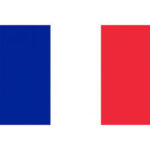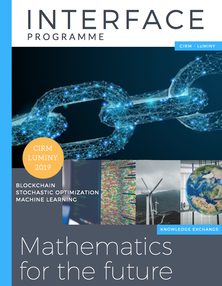|
CIRM subsidizes a variety of conferences and research schools lasting 5 days and gathering between 60 and 95 people. The aim is to give researchers the opportunity to present and discuss recent research results, initiate future collaborative projects and cross-fertilize ideas. Proposals are reviewed by CIRM’s international scientific committee around two years before the events take place.
Funding: selected applications are granted up to 40 « CIRM-Days » (free board and lodging at the centre for 5 days for 40 people). Additional external funding must be found to cover the remaining participants, who can also support themselves. The cost of a week at CIRM is around €500 per participant. |
Deadline for submission: 31 March 2019
|
|
Many scientific projects need time to grow and achieve results. The aim of this new type of programmes lasting several years is to have the opportunity to stage key moments to review things and take stock one week per year at CIRM.
Proposals should fit into one of these two areas:
Timespan: three years on average, with one (or possibly more) week-long event at CIRM every year. Funding: the above programmes must be fully funded through external grants, for the whole duration of the project. The cost of a week at CIRM is around €500 per participant. |
Proposals can be sent throughout the year
|
|
3. JEAN-MORLET CHAIR
CIRM created this semester-long programme in order to extend its cooperation with international researchers, offering them a six-month residential position, during which they collaborate with a local project leader from Aix-Marseille University. Each semester focuses on a different area but follows a similar general structure, combining the organization of a range of scientific events (two large and up to 4 smaller events) with a programme of invitations aimed at attracting international researchers to the Provence-Alpes-Côte d’Azur region. Benefits include an attractive salary, publication with Springer-SMF, subsidies for events and special grants for invitations, onsite accommodation etc.
Proposals are placed online on a dedicated website and evaluated by CIRM’s international scientific committee. An oral presentation also takes place if the project is selected in the first round. Funding: The Chair benefits from specific funding from various sponsors. Holders are also asked to look for additional international co-funders. |
Deadline for submission: 19 April 2019
|
|
4. WORKSHOPS (previously known as Small Groups or Groups)
CIRM also welcomes workshops that run alongside one or two larger event(s) the same week or may run in parallel with other workshops. Note that, with new infrastructure due to open in 2019, workshops will be able to gather up to 35-40 participants. These 4 or 5-day events enable participants to focus on a specific area or on a particular problem. The format is particularly well-adapted to projects funded by the CNRS Groupements de recherche (GDR), or by the Agence Nationale de la Recherche (ANR), and they can also be the perfect way to organize a celebratory event (e.g. Lagrange Days or 30 Years of Wavelets).
One of the advantages of these smaller workshops is that – contrary to larger events that need to be scheduled two years before they take place – proposals can be received at any time. The international scientific committee at CIRM studies proposals as and when they come in, and decides on average within 4 to 6 weeks after receiving them. The Events Officer then arranges specific dates directly with the organizers. Funding: Workshops must be fully funded through external grants. The cost of a week at CIRM is around €500 per participant. |
Proposals can be sent throughout the year
|
|
5. RESEARCH IN PAIRS
Research in Pairs (2 to 4 people) enable researchers to work together on very specific projects such as putting the final touches to a paper or a book, studying a new problem, setting up a collaboration etc. These events last on average 1 to 2 weeks (exceptionally 3 weeks), subject to the need of the project and to vacancies at CIRM during the identified calendar weeks.
One of the advantages of Research in Pairs is that – contrary to larger events that need to be scheduled two years before they take place – applications can be received at any time. The international scientific committee at CIRM studies proposals, as and when they come in, and makes a decision on average 4 to 6 weeks after receiving them. The Events Officer then arranges specific dates directly with the organizers. Funding: board and lodging at CIRM is offered for up to 3 participants from outside the region, usually for 1 or 2 weeks. |
Proposals can be sent throughout the year
|
|
6. CEMRACS (CIRM & SMAI)
Each year, for six weeks, CIRM is home to a summer school programme which is proposed, organized and funded by SMAI (Applied and Industrial Mathematics Society). The application is prepared with SMAI then an online application must be filled in on CIRM’s website. The proposal is then evaluated by CIRM’s international scientific committee during one of their meetings. An additional oral presentation and discussion with the scientific committee takes place 18 months before the start of the summer school. Funding: CEMRACS events must be fully funded through external grants. The cost of a week at CIRM is around €500 per participant. |
The next call will open in the summer 2019
|
|
7. SMF WEEKS (CIRM & SMF)
The French Mathematical Society proposes to fund two distinct weeks per year. The format is determined each year by the SMF in a call for proposals that is published on the SMF website. http://smf.emath.fr/ Funding: SMF may fund up to fifty per cent of the participants, with a maximal number of supported participants equal to 20. |
TBA
|
|
8. THEMATIC MONTH (CIRM & AIX-MARSEILLE UNIVERSITE)
Every February, CIRM and Aix-Marseille University (AMU) stage a 4 or 5-week « Thematic Month » devoted to one particular area (Statistics, Probability, Cryptography, Dynamical Systems etc.). This thematic session features conferences as well as research schools. This special month is sometimes coupled with the general topic of the Jean-Morlet Chair taking place that particular semester, thus allowing exchanges, co-funding opportunities and a larger international presence. Funding: up to 40 CIRM-subsidized places (free board and lodging at the centre) are granted per week. Additional external funding must be found to cover other participants. The cost of a week at CIRM is around €500 per participant. |
Deadline for submission: 31 March 2019
|
|
9. IHP SCHOOLS (CIRM & INSTITUT HENRI POINCARE)
As part of the LABEX Carmin initiative, each year, CIRM reserves two weeks in its calendar in order to stage the introduction weeks to full trimester programmes taking place at Institut Henri Poincaré, Paris. Detailed proposals for these specific weeks must be filled in online in order for CIRM’s international scientific committee to get all the necessary information before deciding to select and sponsor them. |
Deadline for submission: 31 March 2019
|
|
10. INSTITUTIONAL WEEKS
These weeks are aimed at groups of professionals working with mathematicians on a day-to-day basis, which are part of a CNRS Groupement de Services (GDS). They include the Réseau National des Bibliothèques de Mathématiques RNBM (Maths Libraries), the Réseau d’informaticiens MATHRICE (IT), and the Réseau national AUDIMATH (outreach and dissemination). Proposals are studied by CIRM’s international Scientific committee.
NB: CIRM is of course open to other groups wishing to host institutional weeks, whether they come from France or from abroad. If you are interested in finding out more, please contact the Events Officer at CIRM. |
Deadline for submission: 31 March 2019
|
|
‘TRANSFERRING KNOWLEDGE ACQUIRED IN ACADEMIC DEPARTMENTS TO THE SOCIO-ECONOMIC WORLD IN ORDER TO PROMOTE SCIENTIFIC INNOVATION IN INDUSTRY’.
INTERFACE is an original programme of acquisition & discussion of tools and concepts in mathematical, computer and digital sciences, that are pertinent to potential users in industry: modelling, simulation, optimization. Aims and objectives:
|



